Home & Leisure
/ArcaMax

Here's How: Proper Pocket Door Installation Technique
Dear James: I like pocket doors because they save floor space, but they often don't glide smoothly into the wall slot. What is the best method to install one? -- Kevin D.
Dear Kevin: As houses are becoming smaller to lower construction costs and utility bills, interest in pocket doors is making a comeback. They were very popular in the ...Read more

Here's How: Replace Wood Soffit With Low-Maintenance Aluminum
Dear James: I am tired of having to paint soffit on my ranch house. I think installing aluminum soffit with vents is better. Is this a project for the average do-it-yourselfer? -- Juanita F.
Dear Juanita: I would not recommend trying this yourself with a two-story house, but with your one-story ranch, it is a doable project. Aluminum soffit is ...Read more
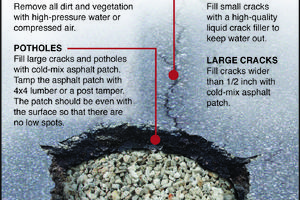
Here's How: Permanent Fix for Driveway Potholes
Dear James: My old driveway gets some new potholes each year I need to fix. What is a good way to do a long-lasting fix without using heat like professionals do? -- Richie G.
Dear Richie: Repairing driveway potholes yourself can be challenging without heat. Heating the asphalt repair materials makes them pliable and easier to compact and stick ...Read more
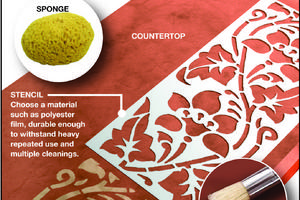
Here's How: Update Kitchen Countertop With Stenciling
Dear James: I am on a tight family budget, but I want to do something to upgrade my old kitchen laminate countertop. What is my least expensive option? -- Kristin W.
Dear Kristin: Laminate countertops are very durable, but the surface can get scratched and stained after years of use. Since a countertop is often the focal point of a kitchen, ...Read more

Here's How: Select the Best Remodeling Contractor
Dear James: I just bought an older house that is going to need quite a remodeling project. Do you have any tips for selecting a good remodeling contractor? -- Kevin S.
Dear Kevin: If you do an internet search, you will find many local remodeling contractors. In general, most are reliable, honest and price things fairly. As in any profession, ...Read more

Here's How: Smaller Tools Are Convenient for Smaller Gardeners
Dear James: I am living in my first house and would like to add a deck myself. I am fairly petite, so standard tools are a bit heavy for me. Are smaller tools available? -- Anita T.
Dear Anita: You should not have a problem building a deck yourself. All home center stores have free deck-building plans and material lists written for the ...Read more
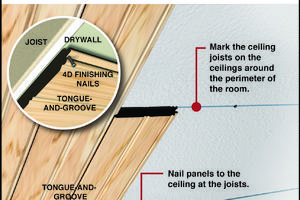
Here's How: Add a Beadboard Plank Ceiling
Dear James: I would like to add some unique ceiling during our dining room remodel project. Is beadboard or plank paneling an option I can install myself? -- Dave B.
Dear Dave: People often think of walls and flooring when planning the room decor, but the ceiling covers just as much area as the floor, and the view of it is totally unobstructed....Read more
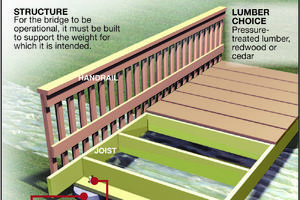
Here's How: Make an Attractive, Functional Garden Bridge
Dear James: There is a low spot that's always wet between my patio and gardens. I think a small decorative bridge would be attractive. What are some building tips? -- Sydney A.
Dear Sydney: The addition of a short decorative bridge can be an attractive and functional improvement to your landscaping, and it will keep your feet dry. When ...Read more
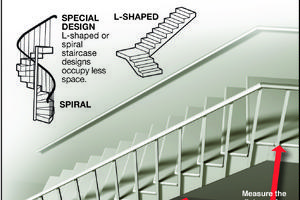
Here's How: Add a Staircase to a New Bedroom
Dear James: I want to add an attractive permanent stairway to our new attic bedroom remodel. I want to do as much of the work as possible myself. What do you recommend? -- Enrique R.
Dear Enrique: Unless you are experienced working precisely with lumber, building a staircase and handrail system totally from scratch is probably beyond the skill ...Read more

Here's How: Laying a Patio
Dear James: We have a deck, but would also like to build a patio near our flower gardens. What are some of the best patio materials to make a durable, attractive patio? -- Emma D.
Dear Emma: The most common patio materials for do-it-yourselfers are brick, ceramic tile, stone or pavers. The installation techniques do vary as does the skill level...Read more

Here's How: Install a Ceramic Tile Shower Floor
Dear James: We could use an extra shower stall for our kids. There is a drain in the utility room floor that we can use. What is a good way to build it so it doesn't leak? -- Jason H.
Dear Jason: Building a shower with a ceramic tile floor is most attractive and durable. Using tile requires attention to detail so it will be leak-free. Study ...Read more

Here's How: Make Fertile Compost From Waste
Dear James: We moved into a new house with open space in the backyard, so I want to build a compost bin. What are some inexpensive options that are effective? -- Sylvia W.
Dear Sylvia: It won't take long to convert organic materials such as food waste, lawn clippings and shrub and tree trimmings into fertile soil. These waste materials make up ...Read more
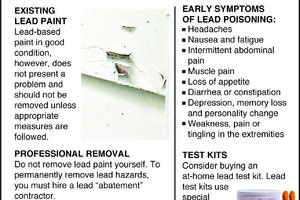
Here's How: Be Careful Around Old Lead Paint
Dear James: We are remodeling our old house which has a lot of painted wood trim. Is there a potential problem with lead being released as we tear out or refinish the wood trim? -- Dennis W.
Dear Dennis: If your house was built before 1978, there is a chance that paint which contains lead was used, especially on the wood trim. Leaded paint was ...Read more






